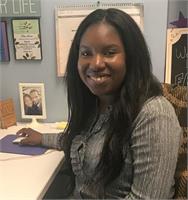by Fatim Lelenta (Ana Clara Blesso is her mentor)

Why did I decide to find a mentor?
A mentor is more than an adviser. A mentor provides you with tools, knowledge, and support throughout and often beyond your academic career. As assistant director/career coach at New York University, I meet with students to discuss how they can highlight their communication, team-oriented, and leadership skills. However, we often forget how valuable mentors are to assist in your professional and personal growth. I witnessed this myself.
One day, I came across the NACE Mentor program. As a new career development professional, this was perfect for what I needed – an opportunity to broaden my network, navigate the transition from student to professional, and strengthen my coaching expertise. I was excited about the opportunity to connect with someone out of the workplace and exchange ideas and insights in a deeper and meaningful way.
NACE connected me with Ana Clara Blesso, associate director of career services at the University of Connecticut, a caring, thoughtful, and talented mentor. Through my conversations with Ana, I was able to learn from a seasoned professional and see things from a different perspective. During our time in the mentor program, Ana connected me to other leaders in career development, encouraged me to document my accomplishments (and be proud of them!) and helped me deal more confidently with the new challenges.
From mentorship to friendship
It was extremely helpful to me to have a mentor who wanted to grow with me. When I was entering a new role in my personal life – motherhood – Ana transitioned from being my

mentor to a dear friend. Her support as I was navigating maternity leave and balancing a new role was impeccable. She was my sounding-board and gave me insights about navigating transitions and provided personal and professional experience about work-life balance. I am grateful for the trust that we built over time and how engaged, authentic she was to my needs. I can vividly remember calling Ana and her sharing her wisdom, insight, and humor that helped me get through an exciting but also challenging phase in my professional career.
All mentees look for role model that have similar interests and experiences to their own. I am lucky in that Ana and I share identities that were outside of our roles as professionals. As a woman of color, it was heart-warming to see parts of myself reflected in my mentor. From this experience and learning from another woman of color, I was able to enter conversations with her as my whole self and not just as my best self.
Being a mentee
Acknowledging the importance of having a mentor is one part of the conversation. It is important to note that mentees must be actively involved in their career and professional development with their mentor’s guidance. Here are a few tips I recommend mentees do to have a successful mentor/mentee relationship:
Set goals: You can do this on your own or set them with your mentor. Think about where you want to be three to six months or one year from now. How can your mentor help you get closer to these goals?
Open to feedback: Once you and your mentor have established trust, it will be easier to both give and to accept feedback. Your mentor wants you to succeed!
Ask questions (and come up with solutions): Before you speak with your mentor, write down questions or thoughts you have. Be sure to come up with some solutions as well.
Reflect: Take moment to reflect on how far you’ve come. There were many times where I would forget to give myself a pat on the back. This was important to remember whenever I faced a new challenge – always remember how far you’ve already come!
Give back: Show appreciation to your mentor as often as you can. I remember sending Ana a gift card for cup of coffee! This small gesture made her day and was one of the many ways that I could thank her for her time.
Takeaways
Mentorship is far more than a one-time conversation. With my mentor’s ongoing support and guidance, I had the encouragement to achieve new goals – joined new professional memberships, attended conferences, submitted a programming proposal, presented a best practice to colleagues, and broadened my professional network. As I personally reflect, I am eternally grateful for the NACE mentor program and for having a great example about what mentorship (and friendship) looks like. I am happy to share that the friendship Ana and I have developed is for life and continues on beyond the mentoring program.
The field of career services needs engaged mentors to guide the future generation of career services professionals. I encourage readers to become a mentor – it’s such a rewarding experience! I also encourage former mentees to serve as a mentor to others—your knowledge is needed! As a whole, we must commit to creating meaningful professional experiences and with time, build long-standing friendships.